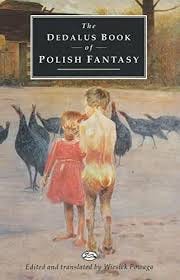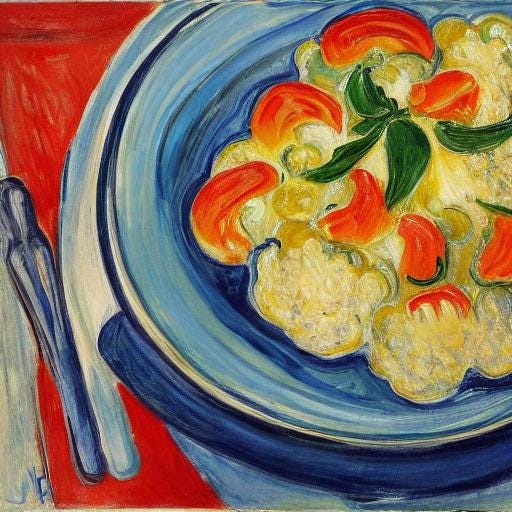"Dinner at Countess Kotłubay's" by Witold Gombrowicz (1904-1969)
The Dedalus Book of Polish Fantasy (1996) Edited by Wiesiek Powaga
Readers unfamiliar with "Dinner at Countess Kotłubay's" may prefer to read these notes only after reading the story.
Like Ukraine, Poland has been trapped between German and Russian empires for several centuries. Like Ukraine, it is the heart of the "bloodlands" where Berlin and Moscow fought two world wars and perpetrated ethnic and political holocausts.
Wiesiek Powaga's introduction to The Dedalus Book of Polish Fantasy reports that Poles have had to get used to their state serving as the devil's treadmill. By turns demonic and comical, the ancient enemy perhaps granted Poland too many wishes, and now nothing can be undone.
"Dinner at Countess Kotłubay's" by Witold Gombrowicz does not feature the devil as antagonist. But it depicts and skewers a dinner party he would find interesting.
Our narrator begins very loftily:
It's difficult to state with absolute certainty what my intimate acquaintance with Countess Kotlubay was founded upon. Naturally, speaking of intimacy, I have in mind only that fragile mode of closeness possible between a full-blooded and to-the-bone aristocratic member of society, and an individual from a sphere which is respectable and worthy enough, but only middle class. I flatter myself that on a good day I possess in my demeanour a certain loftiness, a deeper gaze and a sense of idealism, which allowed me to win the discriminating sympathy of the countess. For since childhood I have felt a close affinity with Pascal's "thinking reed" and have had an inclination towards the sublime; I often spend long hours contemplating lofty and beautiful ideas.
Countess Kotłubay hosts a popular dinner party each Friday. Friday means "no meat," and her chef's dishes are all vegetarian, yet sublime.
Until attendance falls off.
[….] on the previous Friday the countess had caught the cook seasoning her idea of a vegetarian feast with bouillon. What a rascal! I couldn't believe it. Indeed, only a cook could have done such a thing! What's worse the obstinate cook, as I heard, showed no repentance but had the cheek to contrive in his defence a peculiar argument - that he wanted their lordships to have their cake and eat it. What did he mean by that? (Allegedly, his previous employment was with a bishop.)
Thus, our narrator and a few other social register rejects are invited.
A watery pumpkin soup is tolerated, but when the main course is served, things turn around.
The servants brought in an enormous cauliflower swimming in fresh butter, glistening with gold, although on the basis of previous experience one could only assume that its colouring was as misleading as a consumptive's flush....
[….] An extraordinary vista opened before me - that of the countess, an aristocratic patroness and dogaressa, devouring in silence and with such greed that her ears were quivering. It was a sight which both frightened and astonished me. The baron was seconding her bravely, bent over the plate, slurping and smacking with all his heart. The old marquise too was trying to catch up with them, chewing and swallowing enormous chunks, apparently in fear that they would snatch up the best bits from under her nose.
This sudden and incredible picture of gluttony - I can't express it in any other way - such gluttony, in such a house, this dreadful transgression, this crashing discord, so shocked the foundation of my being that, unable to constrain myself, I sneezed. And because I had left my handkerchief in the pocket of my coat I was forced to excuse myself from the guests and leave the table. In the hall, having collapsed on a chair, I tried to calm my bewildered senses.
Only someone who like me had known the countess, the baron and the marquise for such a long time, the elegance of their movements, the delicacy, the frugality and subtlety of all their habits (especially their habits of eating), and the impeccable nobility of their features - only he could appreciate the impression they had made upon me. At that moment I glanced accidentally at a copy of the Red Courier sticking out from my coat pocket and my attention was drawn to a sensational headline:
MYSTERIOUS DISAPPEARANCE OF CAULIFLOWER!
This moment only takes us halfway in "Dinner at Countess Kotłubay's." The narrator's civilized and sensitive petty bourgeois mettle will quickly be tested by teasing revelations from his hostess and other guests. They might be too old, too Jewish, or too grasping to be invited on most Fridays, but our narrator clearly registers that he is supping with half-civilized hyenas.
Will the narrator leave in time to avoid a revelation the other guests delight in hinting at? Will he, like Blackwood's "private secretary in New York," survive?
Like his narrator, Witold Gombrowicz was a man caught between the two great historical ruling classes: proletariat and bourgeoisie. In his Diary (2012) he recounts being stranded in South America with the outbreak of war, then settling in France. He defines his intellectualism as having been formed in "Schopenhauer and Nietzsche’s school." Clearly, each chapter in the author's life and career illustrated his intermediate position as a middle class artist, Pole, and philosophical pessimist.
"Dinner at Countess Kotłubay's" is probably not Gombrowicz consciously condensing his life predicament into a macabre puppet theater matinee. But he might still enjoy the reader's mimicking Countess Kotłubay's lapsus linguae:
Kotuboy [sic], means - "kot-u-boy". "Caught you boy!"
Jay






